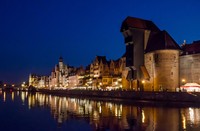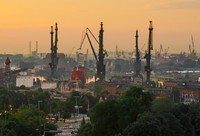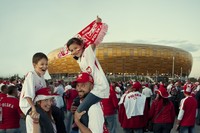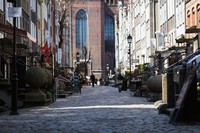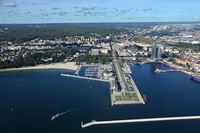The Tri-city (or TriCity, also called Treble City, in Polish Trójmiasto) is an urban area consisting of three Polish cities: Gdańsk, Gdynia and Sopot. They are situated adjacent to one another, in a row, on the coast of the Gdańsk Bay, the Baltic Sea, in Eastern Pomerania (the Pomeranian Voivodeship), northern Poland. The Tricity metropolitan area has a population of over 1 million people. The name Trójmiasto was used informally or semi-formally only until 28 March 2007 when the “Tricity Card” (in Polish “Karta Trójmiasta”) was signed as a declaration of the cities’ cooperation.
The history of Gdańsk begins around 2500 BC, when settlement activity in the area of today’s city started. Ten centuries ago, in March 997 the Slavonic name URBS GYDDANYZC was first recorded in “The Life of St. Adalbert” written in Rome by the monk John Canaparius.
Gdańsk has played an important role in the history of neighbouring states and especially of Poland throughout its thousand-year history. Its convenient location, where Poland’s principal river – the Wisła (the Vistula) – meets the Baltic Sea, has shaped the city’s character and has made it one of the most lively centres of trade in this region of Europe.
Gdańsk is a northern European city, which can be seen from its architecture, culture and science. When walking around the Old Town, you can still see frescos, monuments of kings (Kazimierz Jagiellończyk, Zygmunt August, Jan Sobieski), created centuries ago. Previously, many German and Polish settlers had made their way to the town, as did the Flemish, the Scots, the Jews, the Dutch, the Italians, the French and the Scandinavians. Many famous people of various nationalities come from our city. Gdańsk citizens included famous scientists, such as Jan Hevelius, the astronomer who was born and worked here; Daniel Fahrenheit, the inventor of the thermometer scale still used in America; Arthur Schopenhauer, the world famous philosopher – called the saddest Gdańsk citizen. Gdańsk has always been a city attracting open minds due to its spirit of tolerance. Klaus Kinski, the famous actor, was born in Sopot. The Nobel Prize winner Gunter Grass comes from Gdańsk and his books describe former and contemporary visions of the city. The idea of “Solidarność”, the first free trade union in an Eastern European Russia-dependent country, which gave birth to a great social movement, was also born in our city.
The 16th century is a golden period in the history of Gdańsk. The town, a member of the Hanseatic League, became a marine and economic power, one of the most prosperous in Europe. At that time magnificent churches, public buildings, patricians’ and rich burghers’ houses were built.
Gdańsk twice became a Free Town. First, as a result of the Treaty of Toruń (1466), then after the First World War, when the Treaty of Versailles (1919) established the Free City of Danzig (Gdańsk) in 1920, under the auspices of the League of Nations, via the Commissioner General of the Polish Republic. The existence of the Polish minority among the German majority and the increase in the power of the Nazis (1934-1939) provided a background for confrontation. After World War II, which began with the attack by Hitler’s Germany on Westerplatte, Gdańsk was completely destroyed. After being reincorporated into Polish territory, Gdańsk was carefully restored.
GDYNIA
The history of Gdynia starts in the 13th century. It was a small village owned by monks. In 1922 the Senate of the Republic of Poland passed a law to build a sea port, later open to merchant and navy ships. In 1926 Gdynia officially became a city. Nowadays, Gdynia is one of the fastest growing cities in Poland and it attracts many companies to the region, thanks to its good location.
SOPOT
Sopot is the summer capital of Poland, having a special atmosphere and artistic spirit. With what is the longest wooden pier in Europe and the Music Festival in Opera Leśna, it attracts lots of people from all over Poland and different countries of the world. They come to walk down Monte Cassino Street, relax, meet friends and enjoy the wonderful summer nights either at the seaside or in the numerous cafes, pubs and clubs.
